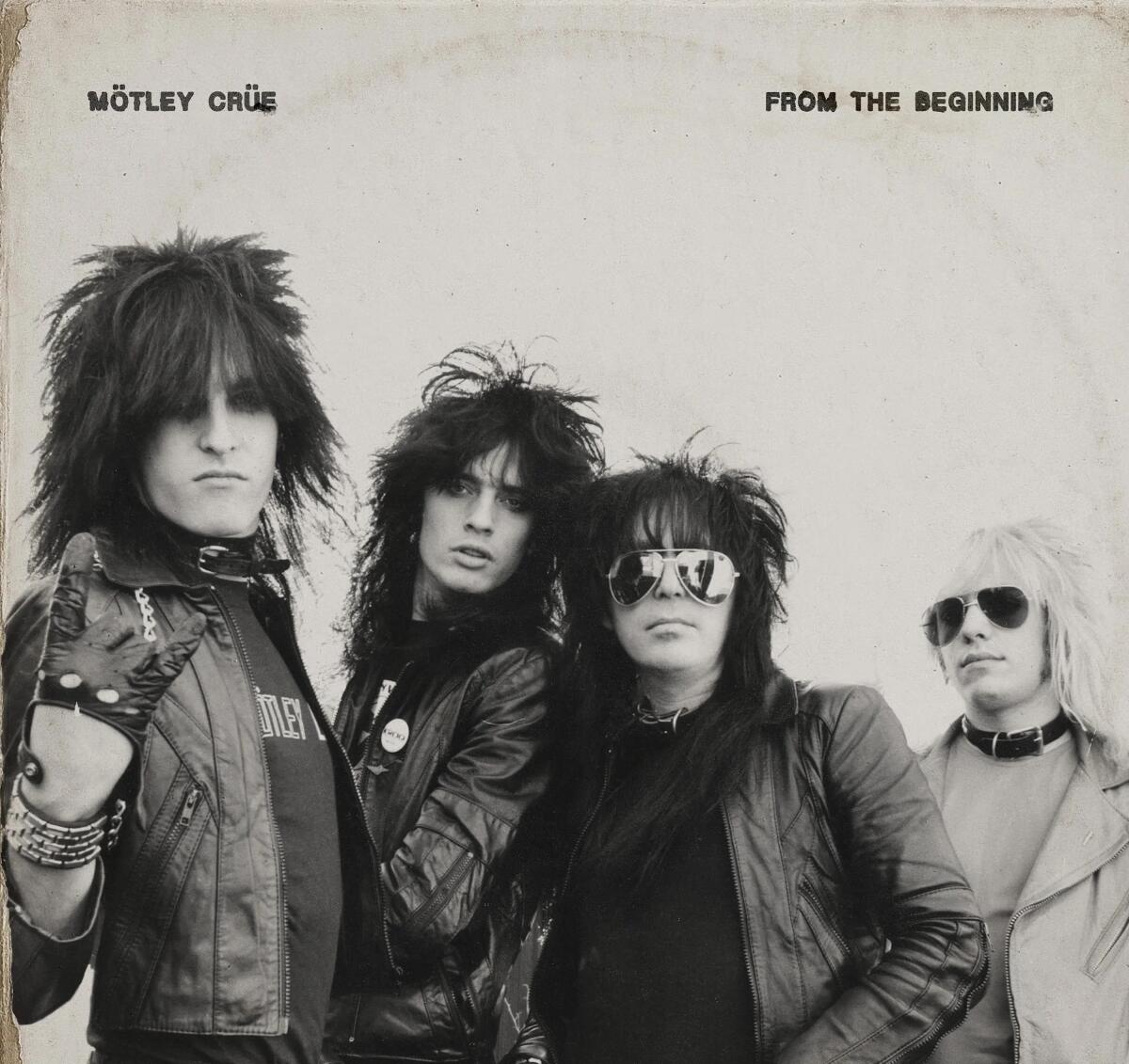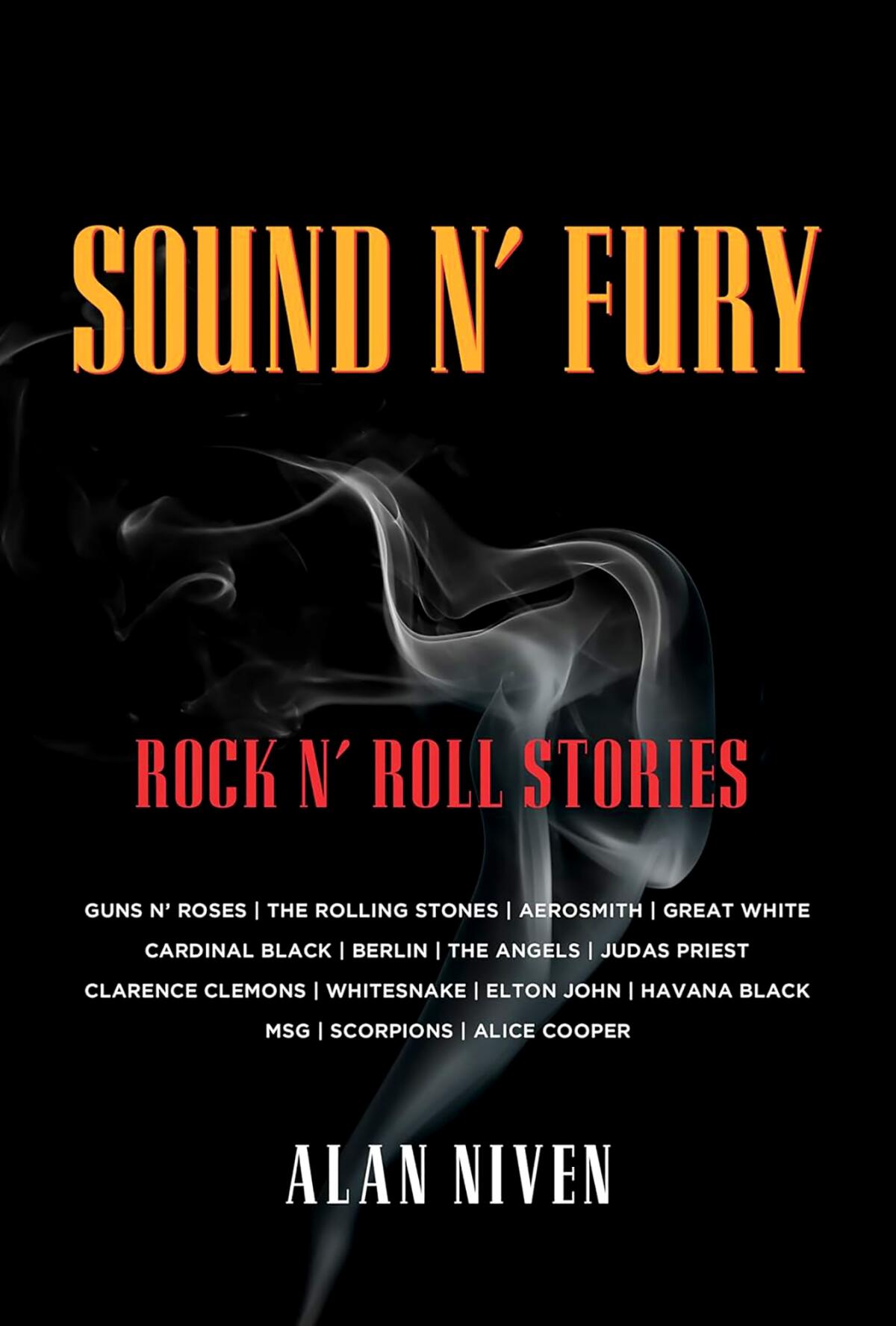Mötley Crüe starts over on new album ‘From the Beginning’
In the beginning, it was 1981 and bassist Nikki Sixx left London, the glam metal band he’d formed in Hollywood three years earlier, to start a new project with drummer Tommy Lee. Then, they pulled in guitarist Mick Mars, who responded to the duo’s classified ad for a “loud, rude, and aggressive guitar player,” and eventually persuaded singer Vince Neil, a former classmate of Lee’s, to leave his band Rock Candy for Mötley Crüe.
From its start with 1981 debut “Too Fast for Love,” Mötley Crüe lived up to its mismatched epithet, from its diabolical breakout “Shout at the Devil” in 1983 to the late ‘80s with its most commercially successful release, “Dr. Feelgood.”
Addictions, near-death experiences, hiatuses, departures and reunions — Mötley Crüe survived them all. Each step on its musical journey is commemorated on “From the Beginning,” an album that includes the band’s first single “Live Wire” through its most recent track, “Dogs of War,” released 43 years later. The band also revived a Mötley Crüe classic with a newly recorded version of its “Theatre of Pain” ballad “Home Sweet Home,” featuring Dolly Parton, which reentered the charts in 2025 at No. 1, 40 years after the original recording’s release.
“Mötley Crüe and Dolly Parton together is the ultimate clickbait,” says Sixx, with a laugh. He previously played bass on the country legend’s 2023 “Rockstar” album. “I guess it’s part of that wow factor that has been part of the Mötley Crüe fabric for a long time.”
Proceeds from the new recording of “Home Sweet Home” benefit Covenant House, the nonprofit with which the band has partnered for nearly 20 years through its Mötley Crüe Giveback Initiative. Sixx first worked with Covenant House around the publication of his 2007 memoir, “The Heroin Diaries,” and helped develop a music program at the Hollywood center. In October 2024, the band also played a series of intimate club shows, dubbed Höllywood Takeöver, at the Troubadour, the Roxy and Whisky a Go Go in West Hollywood, which helped raise $350,000 for the organization.
“These kids are everything,” says Sixx. “These kids are the future. They might end up changing the world. What if one of these kids can cure cancer and they just didn’t have a shot?”
Playing those smaller shows in 2024, which also included the Underworld in Camden, London, and the Bowery Ballroom in New York City, is the bare-bones sound, much like rehearsals, that Sixx has always loved.
“One of my favorite parts about being in a band is rehearsal,” he says. “There’s nothing like it. It’s raw, just bass, drums, guitar, and vocals off the floor. Then, you add all the bells and whistles as you go along. When we can do things like that, it just reminds me who we are.”
It’s also part of what keeps Lee excited at this stage of the band’s career, which includes its third residency in Las Vegas in 13 years, which kicked off last week and runs through Oct. 3 at the Dolby Live at Park MGM. (A portion of the ticket proceeds from the 10-show residency will benefit the Nevada Partnership for Homeless Youth.)
“I’ve been married to Nikki and Vince for over 44 years,” says Lee. “Like with any marriage, you gotta create ways to make it exciting, to keep it fun, or else you find yourselves at the breakfast table, with your face in the paper saying ‘Pass the butter.’ So Vegas in Dolby Atmos, new music, club shows, crazy videos, Dolly — we’ve always been trying different stuff to make the audience and us go ‘Oh, f— yeah.”
For Mötley Crüe, Las Vegas has nearly become a second home since the band’s first residency at the Joint at the Hard Rock Hotel in 2012 and its “An Intimate Evening in Hell” a year later.
“We’ve got this great body of work that you don’t really realize until you get this far,” says Sixx. “But now, we’re in one of those interesting places where, if we don’t play the hits, we get
s—, and if we do play the hits, we get s—.”

“From the Beginning” is Mötley Crüe’s new compilation album.
(Chris Walter)
Some deeper Crüe cuts worth inclusion in the set include “Stick to Your Guns,” a non-single on “Too Fast for Love,” and a song that the Runaways’ ex-manager, producer Kim Fowley, asked a then-teenaged Sixx to write for Blondie in 1979.
“I was 17 years old, and we recorded that song, and because no record company would sign us, we started our own label and got a distribution deal,” Sixx recalls. “When we finally joint-ventured up with Elektra Records in ’82, they said we needed to take a song off since it made the vinyl sound thinner, so ‘Stick to Your Guns’ got cut, but I’ve always loved that song.”
Sixx recently revealed that Guns N’ Roses once considered covering the early Crüe track.
”Now I get people saying, ‘We want to hear, “Stick to Your Guns,” ’ “ says Sixx, laughing. “There’s like eight people that know that song. That’s a good way to shut down an arena.”
For Lee, there’s something more paternal around the band’s lengthy catalog.
“I know every artist says it, but our songs are like our kids,” he says. “And over the years, they grow up and they develop [their] own personalities and character. Some stay pretty close to home, settle down, and start their own family. Others go out on a Thursday night and come home on Sunday with no shoes and a shaved head, but we love them all the same.”
With every song, Lee says, the band members understand each other more. “We know how to push each other a little further, and hopefully get the greatest out of each other.”
While there’s always room to make new music, Sixx, who has been the band’s chief songwriter since its inception, prefers the pace of releasing singles.
“It’s just a different landscape now,” he says, “so to create one or two ideas, or co-write three is manageable, and it’s also digestible for the fans.”
So many things have changed, and he is also aware of some misconceptions about the band. “The music is Mötley Crüe — Mötley Crüe is not ‘The Dirt,’ ” says Sixx, citing the 2019 film based on the band’s 2001 tell-all memoir. “People have it confused because we were so honest and it became such a part of the fabric of us that they forget about the riff on ‘Kick Start My Heart’ and just remember the hotel that we tried to burn down in Ontario.”
Another misconception, Sixx says, is the band’s split with Mars in 2022. After issuing a statement that Mars had retired from touring due to his ongoing battle with ankylosing spondylitis, the guitarist sued Mötley Crüe in April 2023, alleging that he was forced out of the band and that his bandmates attempted to cut his 25% ownership stake. Guitarist John 5 — who has filled in on lead guitar duties since October 2022, prior to the lawsuit — continues to tour with the band.
“[Mick] came to us and said, health-wise, he couldn’t fulfill his contract, and we let him out of the deal,” recalls Sixx. “Then he sued us because he just said that he can’t tour. We were like, ‘Well, if you can’t tour, you can’t tour.’ I will probably come to that too someday.”
Although there was no final settlement in court between Mars and the band, a Los Angeles judge ruled in 2024 that the band failed to provide documents to Mars in a timely manner and was ordered to pay his legal fees, Loudwire reported. The underlying dispute regarding the band’s business and Mars’ potential ousting went into private arbitration.
The arbitration is still ongoing but in the first phase the arbitrator ruled in favor of the band and against Mars. The arbitration is still ongoing but in the first phase the arbitrator ruled in favor of the band and against Mick.
Mars’ claims around the band’s use of backing tracks were another point of contention and something Sixx has continued defending. He says the band started playing around with audio enhancements in 1985 and cites the “Girls Girls Girls” track “Wild Side” as a “perfect example” with its sequenced guitar parts. “Anything we enhance the shows with, we actually played,” he says. “If there are background vocals with my background vocals, and we have background singers to make it sound more like the record. That does not mean we’re not singing.”
Mars, who is currently working on his second solo album, was contacted by The Times but declined to comment for the story.
Sixx calls Mars’ accusations a “crazy betrayal” to his legacy and to the fans. “Saying he played in a band that didn’t play, it’s a betrayal to the band who saved his life,” adds Sixx. “People say things like, ‘Well, if you guys are really playing, then I need isolated tracks from band rehearsal.’ … It’s ludicrous.”
Another battle the band has found itself in involves Neil’s health problems and the criticism he’s faced following recent performances. Originally scheduled to perform in March and April, Mötley Crüe postponed its Las Vegas shows so the lead singer could undergo an undisclosed medical procedure. “He needed time to heal, and he’s been working really hard,” Sixx says.
“You can tell he’s working up the stamina, and a lot of people are like, ‘Oh, man, he’s not kicking ass like he used to,’ but it takes a lot of courage to have a doctor tell you you will probably never go onstage again and to fight through that. If he’s got some imperfect moments here and there. They’re getting erased as the days go with rehearsal.”
Back in Las Vegas, Lee has looked forward to connecting with fans again, even if those in their teens and 20s were turned on to the band via “The Dirt.”
“Our goal is the same for all: to give them an incredible show,” he says, “to leave it all on the stage.”
Now, more than 40 years into Mötley Crüe, it may have been a patchwork journey of emotions for Sixx, but he wouldn’t change the experience for anything.
“We believe in this band,” he says. “It’s been 44 years. We’ve been in the band longer than we weren’t in the band. We’ve seen everything — everything. I guess that’s why it was a movie.”


